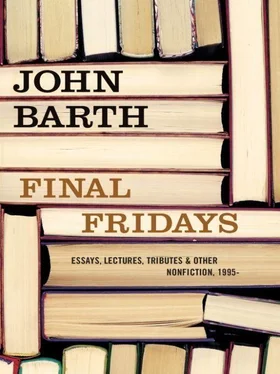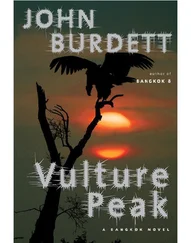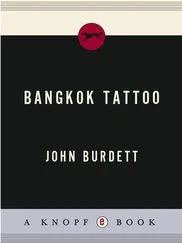9 Notably the Weak, the Strong, and the Participatory, more or less advocated by such distinguished physicists as, respectively, Brandon Carter, Stephen Hawking, and John A. Wheeler.
10 Joseph Heller declares that he begins his novels by writing their last chapter first, after which he invents a sequence of events that necessitates that ending. (See the essay “‘All Trees Are Oak Trees. .,’” farther on in this collection.)
11 Concerning biological evolution, for example, as well as human history, Stephen Jay Gould remarks, “History can be explained, with satisfying rigor if evidence be adequate, after a sequence of events unfolds, but it cannot be predicted with any precision beforehand” (“The Evolution of Life on Earth,” Scientific American , October 1994).
12 E.g. Dante’s out-Virgiling of Virgil in Canto IV of the Inferno , where he writes of himself being saluted in Limbo by the shades of both Homer and Virgil (not to mention Horace, Ovid, and Lucan), who welcome him as their peer.
13 Aeneas sometimes strays from destiny’s path, as in his Carthaginian interlude with Queen Dido (Virgil’s dutiful remake of Odysseus’s long tryst with Calypso), but Mother Venus soon enough corrects his course.
14 A passage that never fails to remind me, profanely but respectfully, of Yeats’s awed question in Leda and the Swan : “A shudder in the loins engenders there / The broken wall, the burning roof and tower / And Agamemnon dead…. / Did she put on his knowledge with his power. .?” On Matthew’s evidence, the son, if not the mother, did.
15 As instanced by Virgil and Dante, the vocation of artisthood bears some analogy to those of mythic-herohood and messiahship — conspicuously so for the Romantics and the great early Modernists, with their characteristic conception of the artist as hero (one recalls James Joyce’s Stephen Dedalus, originally named Stephen Hero, vowing to “forge, in the smithy of my soul, the uncreated conscience of my race”), more modestly so even for Postmoderns. In at least some cases, the present author’s included, one’s apprentice sense of calling may be far from clear even to oneself, and the “Jesus Paradox” may take on difficult additional dimensions, though seldom with such high stakes as attend the callings of mythic heroes and messiahs. One may be uncertain of both one’s vocation and one’s talent for it, or confident of one of those but not the other, or confident of both but mistaken, or doubtful of both but mistaken, or correct on one or both counts. In the happiest case, one comes to have reasonable faith in both calling and gift and at least some “objective” confirmation that that faith is not altogether misplaced. But “real, non-scripted life” is slippery terrain, in which templates and prophecies are ill-defined, elastic, arguable, and verdicts are forever subject to reversal. One crosses one’s fingers, invokes one’s muse, and does one’s best.
How it Was, Maybe
1 It’s the genre’s notorious tendency to substitute period color, historical information, and melodrama for other novelistic values.
2 A totally fabricated account of the doughty Captain’s defloration of that thitherto impregnable maiden. But many scholars question Smith’s own account of his rescue by Pocahontas.
3 In fact, Powhatan’s people stream-bathed almost daily, and found the English to be foul-smelling.
4 Indeed, in a second edition of the satire, published in Annapolis in 1731, Cooke quite de-fangs the sot-weed factor’s closing curse:
. . may that Land where Hospitality
Is every Planter’s darling Quality,
Be by each Trader kindly us’d,
And may no Trader be abus’d;
Thus each of them will deal with Pleasure,
And each increase the other’s Treasure.
I confess my preference for the original ending.
Further Questions?
1 Ann Arbor: University of Michigan Press, 2000.
2 See the memoir “The Judge’s Jokes,” farther on in this volume.
3 A decade later, it exceeds 500.
4 Both figures proportionately higher a decade later, like the number of degree-granting creative writing programs in American colleges.
5 See my essay “It’s a Long Story,” in The Friday Book.
6 For more on these tools, see “The Inkstained Thumb,” farther on in this collection.
7 Enrique García Diez, late of the University of Valencia.
8 “Night-Sea Journey,” in Lost in the Funhouse.
9 Itself now a dated question in the age of DVDs, themselves perhaps outdated in turn by technologies that more with-it folk than my wife and I are acquainted with.
10 See “The State of the Art,” earlier in this volume.
11 See “Eulogy for Jill,” at this volume’s close.
12 Or to the essay following this one: “Incremental Perturbation.”
13 Further elaborated in “Incremental Perturbation.”
14 Boston: Little, Brown, 1991.
Incremental Perturbation
1 Creating Fiction, ed. Checkoway (Cincinnati: Story Press, 1999).
2 More typically, however, the productions of these two writers, unconventional as may be their material and manner, are rigorously conventional in their dramaturgy. Kafka’s “Memoirs of the Kalda Railroad” and Barthelme’s “Bone Bubbles” are examples of non-dramatic extended metaphors; “A Hunger Artist,” “The Country Doctor,” “The Indian Rising,” “Me and Miss Mandible,” and most of the rest are classically constructed stories.
3 E.g., Samuel Beckett’s 35-second drama Breath : Curtain opens on stage empty except for scattered rubbish. Voice-off sound of single human cry. Voice-off sound of single long inhalation and exhalation of breath, accompanied by brightening and then dimming of stage-lights. Again the cry. Curtain closes.
“The Parallels!”
1 I pause immediately here to insert a footnoted but emphatically grateful hurrah to Mr. Weaver for bringing so many excellent modern Italian writers to us language-challenged Americans. There was a time, back in the 1950s and ’60s, when I suspected that the French New Novel might have been invented in New York City by the poet Richard Howard, inasmuch as most of what I knew of Alain Robbe-Grillet and company was in Mr. Howard’s translations. Similarly, most of what I know of such splendid writers as Elsa Morante, Carlo Emilio Gadda, Italo Calvino, and Umberto Eco I know in William Weaver’s English. If I hadn’t had the good fortune to interrogate a couple of these authors personally in the matter, I might well suspect Mr. Weaver of having invented Italian Postmodernist fiction — not that his having Englished it isn’t a sufficiently admirable achievement. Molto grazie , William Weaver!
2 Collected in The Friday Book.
3 The unwritten sixth, to be called “Consistency,” was to have dealt with Samuel Beckett and with Melville’s Bartleby the Scrivener. Esther Calvino’s foreword reports her husband’s remark that he had material enough for eight Norton lectures, of which the last was to have been on Beginnings and Endings (“ Sul cominciare e sul finire” ). There is no mention of what the seventh lecture might have addressed.
4 “Don’t Count on It: A Note on the Number of The 1001 Nights ,” in The Friday Book ; see also “The Morning After” in this volume.
5 Included in his posthumously published The Road to San Giovanni (New York: Pantheon, 1993).
6 Indeed, in the “Autobiographical Essay” he declares, “In the course of a life devoted chiefly to books, I have read but few novels, and in most cases only a sense of duty enabled me to find my way to their last page.”
Читать дальше












